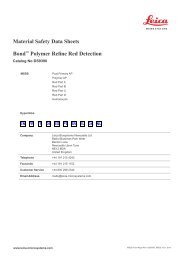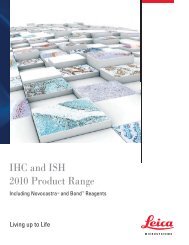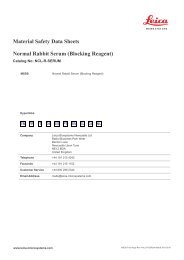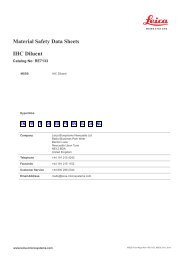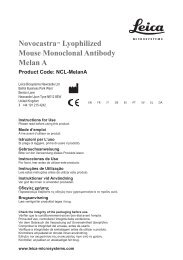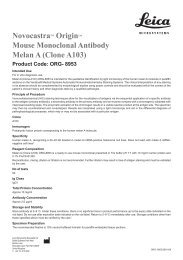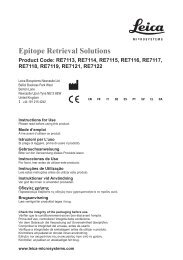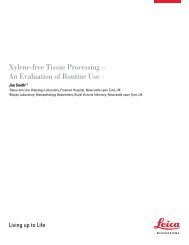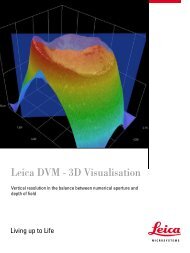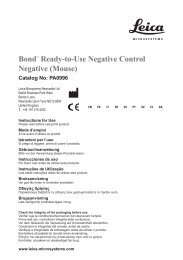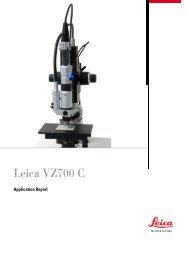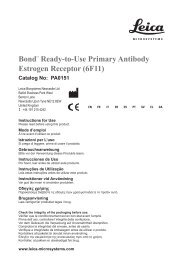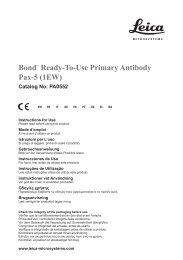QF0159 Marketing Release Record
QF0159 Marketing Release Record
QF0159 Marketing Release Record
You also want an ePaper? Increase the reach of your titles
YUMPU automatically turns print PDFs into web optimized ePapers that Google loves.
Primary Antibodies<br />
Novocastra Mismatch Repair Protein<br />
(MLH1)<br />
Clone ES05 Reference Range<br />
1 mL, 0.1 mL liquid NCL-L-MLH1 P (HIER)<br />
7 mL BOND ready-to-use PA0610 P (HIER)<br />
Antigen Background<br />
MLH1, a mismatch repair protein involved in maintaining the integrity of<br />
genetic information, alongside MSH2, MSH6 and PMS2. During DNA<br />
replication, strand misalignment can occur resulting in alterations to<br />
microsatellite repeats, often referred to as microsatellite instability (MSI).<br />
These defects in DNA repair pathways have been linked to human<br />
carcinogenesis. Mutations in the MLH1 gene have been reported to be found<br />
in tumors with MSI, such as some forms of colon cancer eg Hereditary<br />
nonpolyposis colon cancer (HNPCC), a subset of sporadic carcinomas and<br />
breast cancer. Loss of expression of MLH1 has also been reported in acute<br />
lymphoblastic leukemia, endometrial carcinoma, gastric carcinoma and<br />
ovarian carcinoma.<br />
Human small intestine: immunohistochemical staining for MLH1 protein using NCL-L-MLH1.<br />
Note gradient of staining through the maturing and differentiated epithelial cells of the villi and<br />
also in a proportion of the stromal cells. Paraffin section.<br />
Novocastra Mismatch Repair Protein<br />
(MSH2)<br />
Clone 25D12 Reference Range<br />
1 mL, 0.1 mL lyophilized NCL-MSH2 P (HIER)<br />
7 mL BOND ready-to-use PA0048 P (HIER)<br />
Application<br />
Human mismatch repair protein 2 (MSH2) is involved in the initial recognition<br />
of mismatched nucleotides during the post replication mismatch repair<br />
process. Therefore, the loss of MSH2 function leads to the accumulation of<br />
replication errors, which in turn may be responsible for the multiple<br />
mutations required for multistage carcinogenesis. Mutations in mismatch<br />
repair genes have been linked to hereditary nonpolyposis colon cancer and<br />
to sporadic cancers which exhibit microsatellite instability. MSH2 is<br />
reported to be expressed in the nuclei of cells from a variety of tissues<br />
including thyroid, heart, smooth muscle and the germinal centers of<br />
lymphoid follicles. In ileum and colon, MSH2 expression has been reported<br />
in the crypts, the cells of which are undergoing rapid renewal. They are<br />
responsible for the continuous production of differentiated cells which<br />
migrate over 2 to 4 days before being sloughed into the lumen.<br />
/82<br />
For detailed information on all products please visit our website:<br />
www.leica-microsystems.com<br />
IVD<br />
IVD<br />
IVD<br />
IVD<br />
Novocastra Mismatch Repair Protein<br />
(MSH6)<br />
Clone PU29 Reference Range<br />
1 mL, 0.1 mL liquid NCL-L-MSH6 P (HIER)<br />
7 mL BOND ready-to-use PA0597 P (HIER)<br />
Antigen Background<br />
MSH6 is a 160 kD protein which is involved in DNA mismatch repair (MMR)<br />
and recombination pathways, when heterodimerized with MSH2. Defects in<br />
mismatch repair systems can cause mutations and can cause DNA<br />
microsatellite sequences to become unstable. Microsatellite instability has<br />
been described in colorectal cancer, particularly in Hereditary Nonpolyposis<br />
Colorectal Cancer (HNPCC) where MSH6 expression, along with other MSH<br />
proteins, is disrupted. Immunohistochemical studies have reported that<br />
MSH6 is strongly expressed in the nucleus of cells in normal colonic<br />
epithelium, especially in crypts. Expression is also found in lymphocytes.<br />
Studies have also shown that MSH6 is expressed in gastric carcinomas and<br />
endometrial carcinomas. However, sometimes expression can be lost in<br />
some endometrial carcinomas and colonic carcinomas with microsatellite<br />
instability. MSH6 has been reported to be a useful marker to use in<br />
conjunction with microsatellite instability screening to identify colon tumors<br />
that may contain MMR gene mutations, such as HNPCC.<br />
Product Specific Information<br />
The use of PBS-based diluents may result in increased background staining.<br />
Human colonic carcinoma: immunohistochemical staining for Mismatch Repair Protein 6<br />
(MSH6) using NCL-L-MSH6. Note intense nuclear staining of a proportion of tumor cells.<br />
Paraffin section.<br />
Novocastra Mismatch Repair Protein<br />
(PMS2)<br />
Clone M0R4G<br />
1 mL, 0.1 mL liquid NCL-L-PMS2 P (Enzyme) W<br />
Antigen Background<br />
Postmeiotic segregation increased 2 (PMS2), also known as PMS1 protein<br />
homologue 2, is a DNA mismatch repair (MMR) protein. The PMS2 gene<br />
family members are found in clusters on chromosome 7. PMS2 is a 96 kDa<br />
mismatch repair protein closely related to MLH1, MLH3 and PMS1, which are<br />
homologs of the bacterial mutL gene. The PMS2 protein forms a heterodimer<br />
with the MLH1 protein which is then activated in the presence of ATP; this<br />
complex coordinates the binding of other proteins that repair DNA errors<br />
arising during cell preparation for cell division.<br />
The loss of PMS2 expression in tumors can be helpful in identifying hMLH1<br />
mutation carriers and identify their suitability for mutation analysis.<br />
PMS2 gene defects account for a small but significant proportion of<br />
colorectal cancers and for a substantial proportion of tumors with<br />
microsatellite instability. PMS2 is associated with cases of the dominantly<br />
inherited disorder Hereditary Non-Polyposis Colon Cancer (HNPCC) but more<br />
clearly associated with a variation of HNPCC known as Turcot syndrome.<br />
Products in this catalog are subject to regulatory approval.<br />
Please consult your Leica Microsystems representative for availability in your region.<br />
* For Research Use Only. Not for use in diagnostic procedures.<br />
IVD<br />
IVD<br />
IVD



